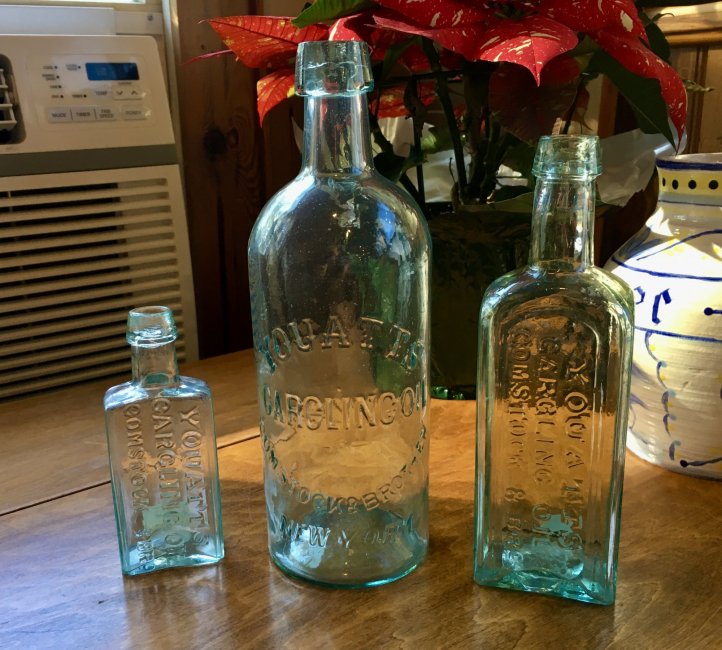bostaurus
Well-Known Member
Finding early veterinary medicines to add to my collection has become difficult. This past year I was able to complete my Youatt collection...I think. The two at the ends are pontiled. The center one is the most common.
William Youatt was born in 1776 in Exeter, England to a surgeon. William trained for the ministry but ended up going to London in 1813 to join a veterinary practice. You did not have to have a veterinary degree to practice at the time in England or the US. Youatt decided to go to veterinary school at the age of 40 but was dismissed without graduating. He stayed with the practice. He began to give private lectures and demonstrations to veterinary students, then lectures at the veterinary schools, eventually writing them down and publishing them in a professional journal…still not a formally trained vet. By 1830 he was writing books on veterinary matters and became the most influential veterinarian of his day, both in England and the US. His writings on artificial selection in the breeding of animals had an influence on Charles Darwin. The Royal Veterinary College was mainly staffed by physicians but was reorganized in 1844 to be comprised of mostly veterinarians. When he was 70 years old he presented himself for examination. He refused to answer any questions but chairman gave him his diploma on the spot.
Youatt suffered from depression and committed suicide in 1847 only a year after he obtained his veterinary diploma. In a strange side note: Youatt’s wife, Mary, was unable to bear children so they had an unusual family set up. A woman named Keziah Jones bore their five daughters. One daughter, Elizabeth, became an author.
There is little known about the medicines he sold in his practice though a broadside from 1817 was sold a couple years ago and now resides in the massive historical veterinary library at Texas A&M. It details activities of his hospital and lists of the medicines, remedies, and medicine chests they offer. Unfortunately I can’t read any of the details from the online picture so I have no idea if he offered something that would become know as a Gargling Oil( a liniment). As far as I can tell there are no surviving bottles from his veterinary practice in England. Gargling Oil seems to have been an American thing and I have never come across the mention of it in English veterinary literature. Youatt’s Gargling Oil was probably the Comstock Brothers attempt to take advantage of Youatt’s famous name and the popularity of Merchant’s Gargling Oil. Those are the only two "Gargling Oils" I know about. That sounds right to me....the Comstock Brothers were masters of business hype.
William Youatt was born in 1776 in Exeter, England to a surgeon. William trained for the ministry but ended up going to London in 1813 to join a veterinary practice. You did not have to have a veterinary degree to practice at the time in England or the US. Youatt decided to go to veterinary school at the age of 40 but was dismissed without graduating. He stayed with the practice. He began to give private lectures and demonstrations to veterinary students, then lectures at the veterinary schools, eventually writing them down and publishing them in a professional journal…still not a formally trained vet. By 1830 he was writing books on veterinary matters and became the most influential veterinarian of his day, both in England and the US. His writings on artificial selection in the breeding of animals had an influence on Charles Darwin. The Royal Veterinary College was mainly staffed by physicians but was reorganized in 1844 to be comprised of mostly veterinarians. When he was 70 years old he presented himself for examination. He refused to answer any questions but chairman gave him his diploma on the spot.
Youatt suffered from depression and committed suicide in 1847 only a year after he obtained his veterinary diploma. In a strange side note: Youatt’s wife, Mary, was unable to bear children so they had an unusual family set up. A woman named Keziah Jones bore their five daughters. One daughter, Elizabeth, became an author.
There is little known about the medicines he sold in his practice though a broadside from 1817 was sold a couple years ago and now resides in the massive historical veterinary library at Texas A&M. It details activities of his hospital and lists of the medicines, remedies, and medicine chests they offer. Unfortunately I can’t read any of the details from the online picture so I have no idea if he offered something that would become know as a Gargling Oil( a liniment). As far as I can tell there are no surviving bottles from his veterinary practice in England. Gargling Oil seems to have been an American thing and I have never come across the mention of it in English veterinary literature. Youatt’s Gargling Oil was probably the Comstock Brothers attempt to take advantage of Youatt’s famous name and the popularity of Merchant’s Gargling Oil. Those are the only two "Gargling Oils" I know about. That sounds right to me....the Comstock Brothers were masters of business hype.

